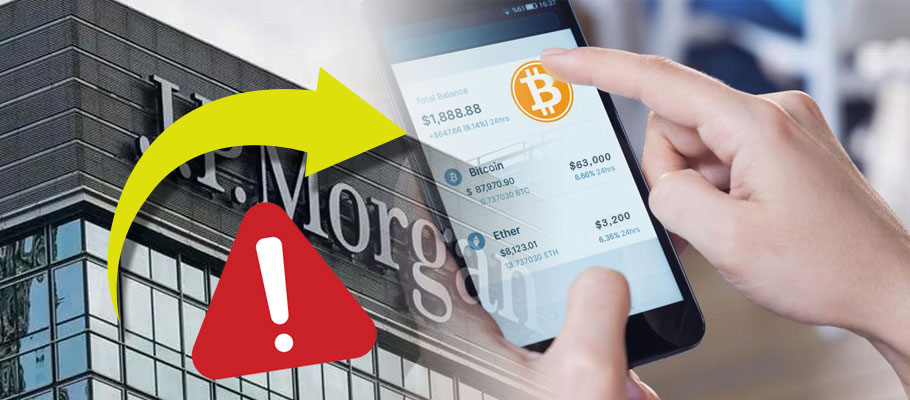
Published: March 20th, 2024
Analytics firm and corporate crypto investor MicroStrategy has built up a horde of 205,000 Bitcoin, equal to around USD 14 billion at current prices. The company's BTC treasury has grown alongside others like Blackrock, which has amassed USD 15 billion worth of BTC to back its iShares Bitcoin Trust.
When TradFi firms extend their crypto investments, it's normally seen as a positive, but some are voicing concern about MicroStrategy's approach to BTC buying.
Analysts at Wall Street Bank JP Morgan are worried that the company's debt-funded Bitcoin purchases are adding leverage and inflating the crypto rally currently underway. In a note to investors published this week, they wrote that there's a risk of sharp deleveraging should Bitcoin suffer a downturn in the future.
Bitcoin enthusiasts have been highly supportive of MicroStrategy Chairman Michael Saylor and his aggressive BTC buying strategy. He recently told Bloomberg that Bitcoin is ‘the best investment asset going. He who gathers the most Bitcoin wins. It's the only endgame.’
Saylor and MicroStrategy have consistently used current Bitcoin holdings as collateral for loans to purchase more Bitcoin. In a round conducted at the start of this week, MicroStrategy announced it was offering up to USD 500 million in convertible senior notes so that it could purchase more Bitcoin.
Despite that move, JP Morgan analysts say the market isn't yet seeing record-high amounts of leverage, which refers to the practice of borrowing funds to grow the returns on an investment. A crypto trader, for example, might make an agreement for 5x leverage to open a USD 500 Bitcoin futures contract, despite having only USD 100 in BTC in their trading account.
In September 2023, MicroStrategy, already the world's number one corporate holder of Bitcoin announced a new acquisition of the market's largest cryptocurrency. The firm made an SEC filing stating it had purchased approximately 5,445 Bitcoin in early August.
The total cash value was listed at USD 147.2 million. At the time, Bitcoin was trading hands at approximately USD 27,051 per coin.
With its latest purchase, MicroStrategy had stuffed its vault to roughly 158,245 BTC. Analysis by CoinGecko puts the average purchase price at circa USD 29,580. Using figures provided in the filing, the aggregate purchase price paid by MicroStrategy for its BTC holdings to be USD 4.67 billion.
While the company's continuing accumulation of Bitcoin supports its public pronouncements in support of the asset, calling it both a store of value and an appreciable long-term asset, the ongoing chill affecting crypto markets currently also pushes its BTC balance sheet notably into the red. That's especially true of historical investments made when Bitcoin was riding high near the USD 60,000 mark.
As if on cue, Bitcoin was down 1.6 per cent on the day, trading just north of USD 26,090 at time of writing. That would value the total Bitcoin held by MicroStrategy at circa USD 4.1 billion.
In June of 2023, the firm purchased 12,330 BTC for USD 346 million. The average purchase price for one coin at the time was USD 29,667.
MicroStrategy began its cryptocurrency acquisition in August of 2020, with co-founder and CEO Michael Saylor saying that the firm's main motivation was to hold BTC as an inflation hedge.
Earlier in 2022, Saylor said the company remains committed to its approach, which is to keep buying and holding Bitcoin over the long term.
‘What's important for us is to be transparent, responsible and consistent.’
Saylor and MicroStrategy have often been at the forefront of BTC adoption, paving the way for risk-averse corporates and institutions to extend their Bitcoin exposure.
When forex traders went bear-ish on BTC in March 2020, a major corporate buy from MicroStrategy played a huge part in returning liquidity to crypto markets. It kicked off a slow but steady appreciation that accelerated in 2021, sending BTC's above USD 60,000.
When Elon Musk purchased Twitter in April of 2022, MicroStrategy CEO Michael Saylor offered Musk congratulations via Twitter, quoting the American Constitution's first amendment, which guarantees that governments can't place limits on free speech.
Saylor's very public show of support amid controversy about how Musk would run the social network helped drive up the price of DOGE (then rumoured to become a form of payment on Twitter) by 24 per cent.
Traditional finance definitely needed to be won over. As recently as January of 2022, analysts at Wall Street stalwart JP Morgan published a report saying Bitcoin would struggle to win over new institutional investors due to its volatility.
In a note to investors, Morgan analysts said they saw 'notable challenges' in the coming months for crypto's biggest coin.
Bitcoin's volatility made it five times more prone to price swings than gold, and the raft of competitors lining up to take a chunk out of Ethereum's market share means its steady rise could be halted or even reversed.
On a more positive note, the market missive also said that the current crypto price slide looked to be 'less dire than the plunge seen in May 2021,' when prices crashed the combined crypto market cap by billions in a single week.
‘It's our view that Bitcoin's most significant challenge going forward is its inherent volatility and the cycles of boom & bust cycles that make extended institutional adoption less likely.’
The note said that BTC, which was down 43 per cent from an all-time high of USD 69,000 reached in November 2021, was also more volatile than gold by a factor of five. That belies the claims of many cryptocurrency commentators who frequently refer to BTC as 'digital gold,' offering hedge protection against inflation similar to what the yellow metal has traditionally provided to investors.